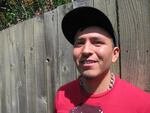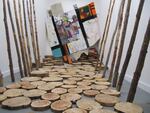
Demian DinéYazhi says the concept for One Flaming Arrow was deeply influenced by punk ethos, Riot Girls, ACT-UP, and other 80s/90s political touchstones.
April Baer / Oregon Public Broadcasting
Demian DinéYazhi, Kaila Farrell-Smith, and Carlee Smith (no relation) started hatching plans for an all-Indian contemporary arts festival long before it was clear they'd get much community support. But with a successful Kickstarter campaign behind them, grants from PICA's Precipice Fund, the Potlatch Fund, and the Na'ah Illahee Fund fueling the fire, their festival, One Flaming Arrow, is starting to look like an even brighter idea.

From the left: Natalie Ball, MFA (Klamath-Modoc), Carlee Smith (Mestiza Colombiana), Brittany Britton, MFA (Hupa), Kaila Farrell-Smith, MFA (Klamath-Modoc), Rochelle Kulei Nielson, MFA (Northwestern Band of Shoshone Nation), Demian DinéYazhi’, BFA (Diné), Top Row: Tom Greyeyes, MFA Candidate (Diné).
Tim Burgess
DinéYazhi (Indigenous Diné) is a recent PNCA grad who works with photography, text-based mediums, and video installation. He has also done some curating. He and Farrell-Smith (Klamath/Modoc) are two-thirds of the collective RISE. They pulled together film screenings, art shows, music, readings, and more, through June 14th.
Farrell-Smith had a key role in curating some of the regional artists at the festival — in particular, the collection of visual artists showing at the north-end gallery, Surplus Space. Natalie Ball is a Modoc/Klamath member and recent U of O grad. Her family trace their lineage back to Kintpuash, known to white people during the Modoc War as the resistance leader Captain Jack. Ball tracked down 1800s-era newspaper clippings of her great great grandfather, and made them part of the installation she's showing at the festival this week, "Mapping Coyote Black."

"Mapping Coyote Black", Natalie Ball
April Baer / Oregon Public Broadcasting
"They're going to get ready to disintegrate in five minutes," Ball laughs, gesturing at the aging sheets of newsprint. "But you can touch them."
The walls are hung with quilts Ball made, coyote heads & teeth, and beaded crowns. She layered the floor with discs made of the trunks of evergreen trees cut during tribal harvests. The air in the gallery hangs thick and sweet with piney smells. Trying to walk over the wood’s uneven surface, though, is tricky.
“Entering the space, you have to be really conscious of how you move—I'm interested to see what the viewer does,” says Ball, adding that there’s an intentional symmetry with the way Native peoples are made to move gingerly through the world, constantly aware of identity.
Other artists at the festival include poet and performer Amanda Ranth (Shoshonne-Bannock); Dylan Miner, who'll bring an iteration of his ongoing project "Native Kids Ride Bikes;" and experimental composer Raven Chacon (click for the Q&A).
Noting New York’s Whitney Museum’s recent opening of a show surveyed 406 American contemporary artists that included only one Native American, DineYazhi says there's huge value for Native artists coming together to create and work in dialogue with each other.
